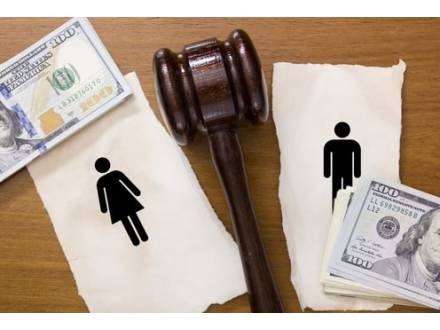Can Conversion Reverse the Commingling of Separate Assets?
 Many spouses are stunned when they find out during their divorce that the property, gift, or inheritance they believed was their separate property turns out to be a marital asset, thanks to commingling. If a person owns a home or other property, has an inheritance, or has amassed a sizeable bank account before marriage, these assets belong to that spouse alone unless they have been commingled.
Many spouses are stunned when they find out during their divorce that the property, gift, or inheritance they believed was their separate property turns out to be a marital asset, thanks to commingling. If a person owns a home or other property, has an inheritance, or has amassed a sizeable bank account before marriage, these assets belong to that spouse alone unless they have been commingled.
Commingling occurs when a separate asset is mixed in with marital assets, changing it into a marital asset that needs to be divided in a divorce. For example, suppose one spouse owns a home that was left to them by their great aunt. If the spouse who owns the home adds the other spouse to the title, it could easily be claimed as marital property by the second spouse in divorce court.
There are other, less obvious and often unintentional ways property can be commingled. Our Kane County divorce attorney handles complex property division cases and can help you understand what your options are.
How Does Property Become Commingled During Marriage?
Real Estate
One of the most commonly commingled assets is real estate. Many people get married after they already own real estate, and they assume whatever they owned will stay theirs in a divorce. That is not always true, however.
Even without placing the other spouse on a deed, if marital funds are used to make improvements to a property or the other spouse works on the home extensively, at least a portion of the home becomes marital property.
Bank Accounts
Bank accounts provide another common example of commingling. You might have had $50,000 in a savings account before marriage. If you deposited your paychecks earned during the marriage into this same account, the separate funds become commingled with marital funds. Once separate and marital money mix in one account, tracing which dollars are which becomes nearly impossible.
Investments
Investment accounts work the same way. If you owned stocks before marriage but used marital income to buy additional shares in the same account, the entire account might become marital property. Even if you can show which shares were purchased before marriage, the commingling creates arguments about whether gains on those shares are separate or marital.
Retirement Accounts
Retirement accounts can be commingled, too. If you had a 401(k) before marriage and continued contributing to it during marriage using marital income, determining what portion is separate versus marital requires complex calculations. The premarital balance plus its growth might remain separate, but contributions during marriage and their growth are marital.
Businesses
Business interests present complicated commingling issues. If you owned a business before marriage but your spouse contributed labor, ideas, or marital funds to help grow it, the increased value might be marital property even though you owned the original business. Illinois courts under 750 ILCS 5/503 look at whether marital efforts or funds increased the business value.
What Is the Legal Presumption About Commingled Property?
Illinois law under the Illinois Marriage and Dissolution of Marriage Act in 750 ILCS 5/503 presumes that property acquired during marriage is marital property. The burden falls on the spouse claiming property is separate to prove it is separate.
The blending of separate assets into marital assets is known as commingling or transmutation. Both of these terms are based on the presumption that the owner of the nonmarital property intended to make a gift of it to the marital estate. This presumption makes it difficult to reclaim property once commingling has occurred. Whether someone actually intends to commingle personal with marital assets matters significantly. Courts ask whether you knowingly and intentionally commingled the assets or whether it happened accidentally.
What Is a Conversion Claim?
Once a property has been commingled, is there anything to be done so you can keep it in your divorce? One potential way to keep property you believe is separate during a divorce is through something known as conversion.
Conversion in property law means the wrongful taking or use of property belonging to another person. When applied to marital property division, it provides a mechanism to reclaim separate property that your spouse wrongfully treated as marital.
To claim conversion, the spouse who asserts a certain property or asset is separate must prove that:
-
He or she has a right to the property or asset.
-
He or she has an absolute and unconditional right to the immediate possession of the property.
-
His or her spouse wrongfully assumed control, dominion, or ownership of the property.
-
He or she now demands the return of the property.
If a conversion claim is successful, the standard remedy is to return the property to the spouse who originally owned it as separate property, so it is no longer subject to the division of marital assets. Whether or not conversion is successful for you in your specific situation will depend on many things.

When Does a Conversion Claim Work?
Conversion claims may succeed if you can prove your spouse wrongfully exercised control over your separate property without your consent or knowledge. Perhaps your spouse forged your signature to add themselves to a deed. Maybe they took money from your separate inheritance account without permission. These situations show wrongful taking that supports conversion.
Conversion might also work if you were deceived about what you were signing. If your spouse told you a document was something innocuous but it actually transferred your separate property into joint ownership, the fraud supports a conversion claim. Courts will not enforce property transfers that were obtained through deception.
Cases involving financial abuse often support conversion claims. If your spouse controlled all finances and unilaterally moved your separate assets into joint accounts or their own name, this wrongful assumption of control can be reversed. The key is showing you did not freely consent to the commingling.
However, conversion claims are very rare. More commonly, spouses reclaim their personal property by asset tracing or dissipation claims.
Call a Kane County, IL Marital and Nonmarital Property Lawyer
If your spouse is claiming your separate property is half his or hers, but you believe otherwise, it is in your best interests to speak to an Aurora, IL property division attorney with The Law Office of Matthew M. Williams, P.C.. Only a knowledgeable asset division attorney can help you sort out those details and determine whether a claim of conversion is likely to be successful. Call 630-409-8184 to schedule an appointment with one of our highly qualified lawyers.

 630-409-8184
630-409-8184













